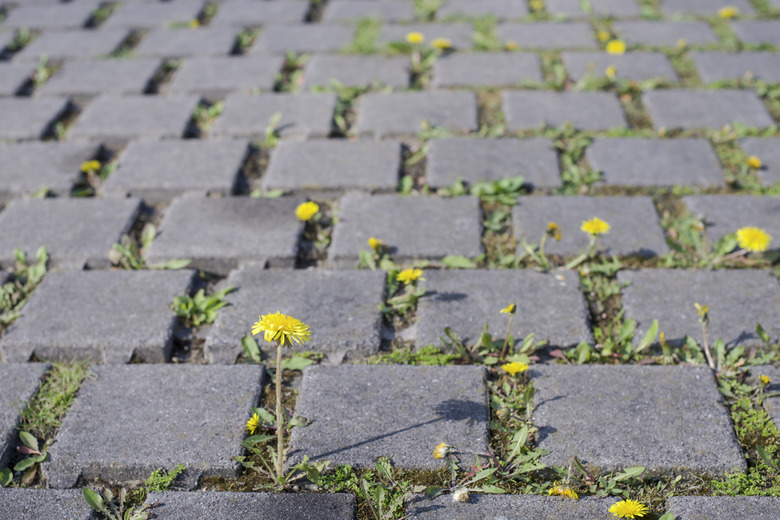How To Use Salt To Kill Weeds
If you're looking for an organic form of weed control for your yard, look no further than your kitchen cabinet. Salt is effective at killing weeds, providing a natural and inexpensive alternative to chemical herbicides. Salt kills weeds on contact, due to its natural desiccant properties. Despite its effectiveness, salt is only suitable for killing weeds on paths, patios and driveways.
Where to Use Salt
While salt is an effective killer of broad leaf and grassy weeds, it also kills any other plants it touches. This means you may unintentionally kill flowers, shrubs and parts of your lawn. Don't use salt in a vegetable garden as it will likely kill your plants as well as the weeds. In addition to killing plants on contact, salt makes the soil sterile, creating an unfavorable environment for growing plants. For this reason, only use salt as a weed killer in between the cracks and crevices of driveways, walkways and other areas where you're not growing plants. Do not use it near garden beds or lawns.
Applying Salt for Weeds
To create a weedkiller for your walkways and hardscapes, mix 1 cup of salt with 2 cups of water and bring the mixture to a boil. Once the mixture has cooled slightly, pour about 1/8 of a cup directly over each weed or tuft of grass that is poking through the pavement. The hot water provides and added effect for killing weeds, salt alone does the trick. If you use it hot, be careful not to spill it and make sure you have a clear path to the weeds you want to kill. Keep children and pets away, too. If you don't like the idea of transporting hot water back and forth, sprinkle 1/2 teaspoon of salt over each of the weeds growing up from the crevices. Table salt and sea salt work, as do rock salt and water softener salt. Use whatever you have on hand.
Repeat Applications and Effectiveness
Salt is only effective for killing annual broad leaf weeds and grasses. Salt burns the foliage at the soil level, causing it to shrivel and die. Salt is less effective for pesky perennial broad leaf weeds and grasses. Although salt penetrates the soil, it does not kill the root system of perennial weeds, making reapplication necessary as perennial weeds spring up. When applied alone, salt should be sprinkled on weeds before a rainstorm to allow the water to mix with the salt. But when applying a salt and water solution to kill weeds, wait for a clear day without rain. The rainwater may dilute your salt herbicide too much for it to be effective.
How Salt Works
Salt kills weeds and other plants because it dries the plants out. As a desiccant, salt pulls moisture from cells within the plant and prevents rehydration, making the plant unable to repair the damage from water loss. Weeds become dehydrated and die due to the lack of water. Sunlight and high temperatures only add to salt's effectiveness, as dehydrated weed plants are weakened and suffer more readily from scald and burning.
References
- University of Illinois Extension: Registered Herbicides Recommended Over Non-Conventional Weed Killing Mixes Touted Online
- University of Illinois Department of Physics: Killing Weeds with Salt
- University of Georgia Cooperative Extension: Alternatives to Synthetic Herbicides for Weed Management in Container Nurseries
- Reader's Digest: 11 Ways to Kill Garden Weeds
- Ohio State University Extension: Garden Myths & Legends: Which Ones Really Work?
- North Dakota State University Crop & Pest Report: Homemade Herbicide
